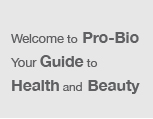To Health, Beauty, and a Flat Stomach!
Do you suffer from IBS, Crohns, Colitis, Candida,
Constipation, Diarrhea, Bloating, Yeast Infections, Lactose
Intolerance,
and other Digestive Disorders? Pro-Gastro 8 is the right solution
for you!
New Article
Probiotic Benefits Milan - Some headaches may be linked to an infection and daily doses of friendly bacteria could ward them off, preliminary research suggests.
A study presented here Friday at an infectious diseases conference found about 18 percent of chronic migraine sufferers were infected with the stomach bug Helicobacter pylori. Antibiotics appeared to clear the headaches.
Adding the friendly bacteria, Lactobacillus, seemed to work even better, leaving most people migraine-free for a year and lessening the intensity and frequency of recurring headaches in the others, the lead researcher said.
Experts were cautiously receptive but said the findings were too tentative to draw firm conclusions.
Helicobacter pylori, the bug that causes stomach ulcers, has recently been linked to a growing list of diseases, including heart disease and autoimmune diseases.
In the study, Italian scientists divided 130 patients who had migraines and were infected with Helicobacter pylori into two groups.
One group was given a three-week course of antibiotics and the other got the three weeks of antibiotics plus Lactobacillus or probiotic, found in yogurt. The probiotic group took three Lactobacillus doses a day for three months, then dropped their intake to one dose a day for the next nine months.
After one year, significant differences were found, said the study's leader, Dr. Maria Gismondo, head of the clinical microbiology laboratory at the University of Milan.
At the end of the year, 50 percent of the people who got the antibiotics alone were still getting migraines. That compared with only 20 percent still getting migraines in the group who took the probiotics.
Headaches in the probiotic group occurred less often, were milder and went away more quickly than they did in the antibiotics group.
The Helicobacter pylori infection findings were similar. After
a year, the bacteria were 40 percent fewer in the group who
took antibiotics and 70 percent fewer in the group getting
the combination treatment.
KEYWORDS: HEALTH
Copyright 2002, Newsday Inc.
THE ASSOCIATED PRESS, Study: Bacteria Can Help Migraines,
04-27-2002, pp A13.
Probiotic Effect on IBS
Clinical studies have been conducted and researched to assess the effectiveness of the active components of Pro-Gastro 8 in treating Irritable Bowel Syndrome disease and generate natural balance in the digestive system. To learn more about these studies, click here to read the article on Pro-Gastro 8 by Dr. Harry K. Panjwani.
Pro-Gastro 8 has proved to be very effective with IBS patients. Its active ingredients of probiotic nutrients and acidophilus have helped many IBS suffering in dealing with this disease. Here is the testimonial from one of our happy clients:
Dear Probio,
I am writing to thank you for changing my life. I am 29 years old female who has suffered with severe stomach problems for 10 years. I have been to every doctor and specialist, I have had every test run including cat scan and was diagnosed with severe IBS. That's when the doctors tell you they can't help you. I had symptoms so bad I could not eat at one point. I was down to 89 pounds. I was in pain all day cramping everything that goes with this horrible syndrome. After 3 days of taking the Prebiotique 8 (now called Pro-Gastro 8) I could not believe how much better I felt for the first time in 10 years. I had no pain. Its been a month now on your product and I no longer have IBS. To all the IBS sufferers I have tried everything ,Prebiotique 8 (now called Pro-Gastro 8) is the only thing that worked. There is no need to suffer with this horrible syndrome.
Thank you again Probio
Always your customer
Lisa Williams - El Dorado Hills -CA
Several other sufferers of various digestive disorders have
found Prebiotique 8 (now called Pro-Gastro 8) to be the most
effective in treating their diseases.
JUST WHAT DO THE PROBIOTICS DO ?
It must be stressed that in the human gastrointestinal tract where not only absorption of food takes place but also our immune systems and other protection mechanisms are also maintained. Natural microflora-approximately 400 different types of living bacterial micro-organisms-establish themselves in the intestinal tract. They help the body fight infections. They are affected adversely by improper diet, such as excessive use of refined foods, long-term use of antibiotics and other medications, stressful lifestyle, and bad habits.
In recent years, we have had a poliferation of coffee houses, cyber cafes, cigar clubs in spite of what we know about damage from excessive use of nicotine, sugar and caffeine. The human body is a very well designed intricate piece of machinery which should be kept in balance and well maintained. Add to that family disruptions, job and financial problems, long work hours, hasty meals, long commutes, hard to handle pollution of air, soil and water, and lack of adequate sleep and water intake. They all work against us.
Probiotics are the intestinal flora, notably lactobacillus Acidophilus (present in the small intestine) and Bifidobacterium Bifidus (present in the Colon). Intestinal flora are made up of many kinds of living bacteria which maintain a symbiotic relationship with the rest of the body. L. Acidophilus and B. Bifidus are available as supplements, not unlike vitamins and minerals when the body may be deficient. They are gatekeepers of the body and help with absorption of the nutrients and elimination of pathogens and toxins. For example, bloating and gas formation are common uncomfortable symptoms when probiotics are deficient. Yogurt has been used for centuries as a source of probiotics. It is particularly helpful in lactose intolerant persons. Lactic ferments in yogurt secrete enzymes like lactase that convert lactose into lactic acid. They make lactose more digestible.
Probiotics also promote absorption of calcium and provide B vitamins. They are helpful in the elderly where it helps with constipation by promoting intestinal peristalsis and lowering PH. They especially play an important role in combating infections, lowered resistance, tiredness and dull skin. They maintain a balance between different micro-organisms in the intestinal tract, most of which are usually harmless. They also inhibit pathogenic bacteria. Antibiotics, especially prolonged use, and also indirectly though use of meat products fed to cattle, results in overpopulation of Candida (fungus) and can be controlled with probiotics.
We do not yet know what impact genetically modified foods may have since such foods do not always carry the necessary label and are not being monitored yet. Cheese, miso and tempeh are also helpful but do not provide long term colonization of the intestine, whereas the use of supplements is more consistent. Their ability to create low acid ph, especially in the intestine and vigina, does not allow the growth of pathogenic bacteria. Other possible uses of probiotics are in Irritable Bowel Syndrome (IBS) yeast infections, lactose intolerance (partial or complete), urinary tract infection, and may reduce the risk of colon cancer and is known to lower cholesterol. It is helpful in post-cancer patients on chemotherapy or radiation where diarrhea is common which may be relieved by probiotics.
Like most medical and nutritional products, it is available as a tablet, powder, liquid and capsule form and can also be used as a viginal douche. It is always prudent that any treatment should be medically supervised as a cautionary measure. Probiotics are considered safe and have no known side effects, no toxicity or contraindications. They are adversely affected by alcohol, excessive use of antibiotics and prevent recurrent infections after intermittent use of antibiotics. Probiotics are commonly used in Europe, in conjunction with appropriate diet.
Harry K. Panjwani, M.D., Ph.D.
45 N. Broad Street, Suite 407, Post Box 398
Ridgewood, NJ 07451
Phone: (201) 447-2033 Fax: (201) 447-9172





